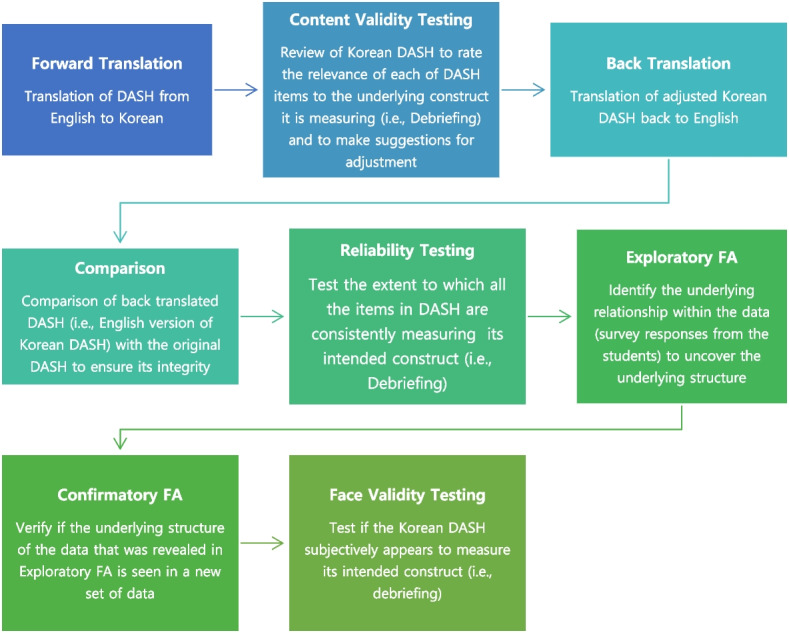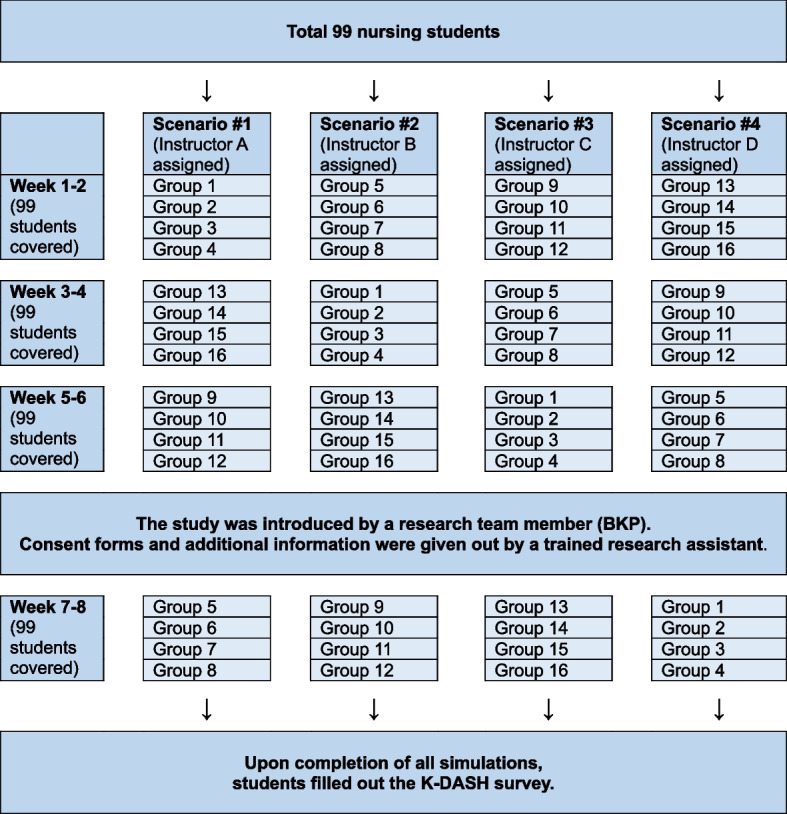下载PDF
{"title":"Testing reliability and validity of the Korean version of Debriefing Assessment for Simulation in Healthcare (K-DASH).","authors":"Seon-Yoon Chung, Bu Kyung Park, Myoung Jin Kim, Jenny W Rudolph, Mary Fey, Robert Simon","doi":"10.1186/s41077-024-00305-3","DOIUrl":null,"url":null,"abstract":"<p><strong>Background: </strong>Use of the Debriefing Assessment for Simulation in Healthcare (DASH<sup>©</sup>) would be beneficial for novice debriefers with less or no formal training in debriefing. However, the DASH translated into Korean and tested for psychometrics is not yet available. Thus, this study was to develop a Korean version of the DASH student version (SV) and test its reliability and validity among baccalaureate nursing students in Korea.</p><p><strong>Methods: </strong>The participants were 99 baccalaureate nursing students. Content validity using content validity index (CVI), construct validity using exploratory factor analysis (EFA) and confirmatory factor analysis (CFA), and internal consistency using Cronbach's alpha coefficient were assessed.</p><p><strong>Results: </strong>Both Item-CVIs and Scale-CVI were acceptable. EFA supported the unidimensional latent structure of Korean DASH-SV and results of CFA indicated 6 items converged within the extracted factor, significantly contributing to the factor (p ≤ .05). Items were internally consistent (Cronbach's α = 0.82).</p><p><strong>Conclusion: </strong>The Korean version of the DASH-SV is arguably a valid and reliable measure of instructor behaviors that could improve faculty debriefing and student learning in the long term.</p>","PeriodicalId":72108,"journal":{"name":"Advances in simulation (London, England)","volume":"9 1","pages":"32"},"PeriodicalIF":4.7000,"publicationDate":"2024-08-08","publicationTypes":"Journal Article","fieldsOfStudy":null,"isOpenAccess":false,"openAccessPdf":"https://www.ncbi.nlm.nih.gov/pmc/articles/PMC11308559/pdf/","citationCount":"0","resultStr":null,"platform":"Semanticscholar","paperid":null,"PeriodicalName":"Advances in simulation (London, England)","FirstCategoryId":"1085","ListUrlMain":"https://doi.org/10.1186/s41077-024-00305-3","RegionNum":0,"RegionCategory":null,"ArticlePicture":[],"TitleCN":null,"AbstractTextCN":null,"PMCID":null,"EPubDate":"","PubModel":"","JCR":"Q2","JCRName":"HEALTH CARE SCIENCES & SERVICES","Score":null,"Total":0}
引用次数: 0
引用
批量引用
Abstract
Background: Use of the Debriefing Assessment for Simulation in Healthcare (DASH© ) would be beneficial for novice debriefers with less or no formal training in debriefing. However, the DASH translated into Korean and tested for psychometrics is not yet available. Thus, this study was to develop a Korean version of the DASH student version (SV) and test its reliability and validity among baccalaureate nursing students in Korea.
Methods: The participants were 99 baccalaureate nursing students. Content validity using content validity index (CVI), construct validity using exploratory factor analysis (EFA) and confirmatory factor analysis (CFA), and internal consistency using Cronbach's alpha coefficient were assessed.
Results: Both Item-CVIs and Scale-CVI were acceptable. EFA supported the unidimensional latent structure of Korean DASH-SV and results of CFA indicated 6 items converged within the extracted factor, significantly contributing to the factor (p ≤ .05). Items were internally consistent (Cronbach's α = 0.82).
Conclusion: The Korean version of the DASH-SV is arguably a valid and reliable measure of instructor behaviors that could improve faculty debriefing and student learning in the long term.
测试韩国版医疗保健模拟汇报评估(K-DASH)的可靠性和有效性。
背景:使用 "医疗保健模拟汇报评估"(DASH©)将对接受过较少或未接受过正式汇报培训的新手汇报者大有裨益。然而,DASH 尚未翻译成韩文并进行心理测试。因此,本研究旨在开发韩语版的 DASH 学生版(SV),并在韩国护理本科生中测试其信度和效度:方法:研究对象为 99 名护理本科生。使用内容效度指数(CVI)评估内容效度,使用探索性因素分析(EFA)和确认性因素分析(CFA)评估构架效度,使用克朗巴赫α系数评估内部一致性:结果:项目-CVI 和量表-CVI 均可接受。EFA支持韩国DASH-SV的单维潜在结构,CFA结果表明,6个项目在提取因子中趋同,对因子有显著贡献(p≤ .05)。各项目具有内部一致性(Cronbach's α = 0.82):韩国版 DASH-SV 可以说是一种有效、可靠的教员行为测量方法,可以长期改善教员汇报和学生学习。
本文章由计算机程序翻译,如有差异,请以英文原文为准。



